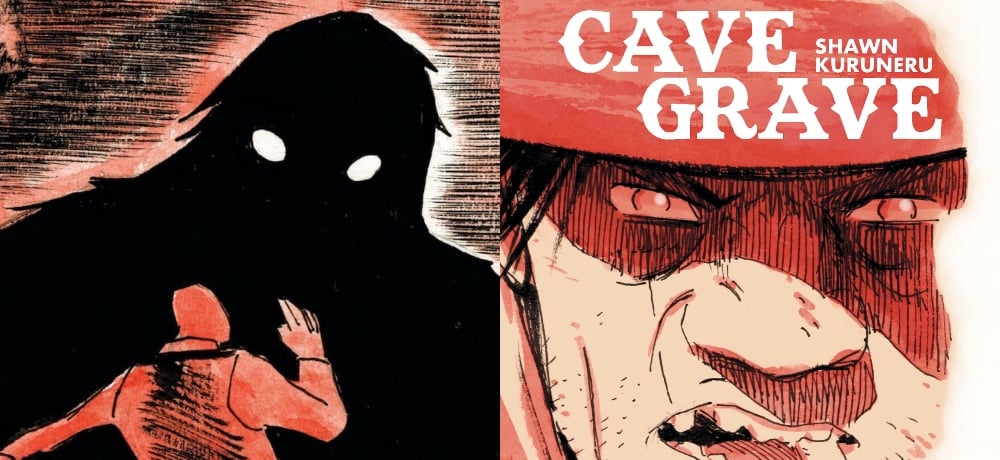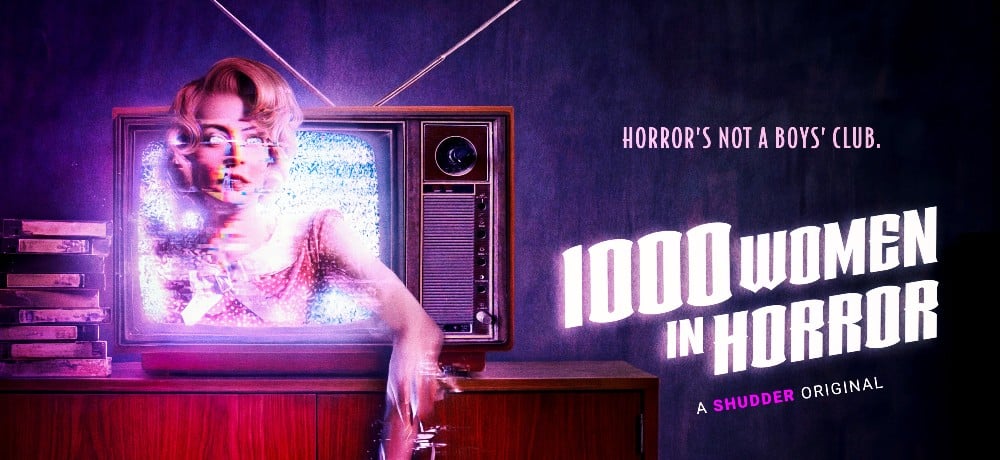





As a horror fan of a certain age (let’s just say older than 30 but younger than 40), I know I’m not alone when I say that The Monster Squad played a significant role in developing my love for the genre. The film has garnered such a rabid following in the decades since its release that the movie’s star André Gower teamed up with writer/producer Henry Darrow McComas to make the documentary Wolfman’s Got Nards. The documentary takes a compelling look at The Monster Squad’s evolution from its development, to its disappointing box office run, to its discovery via home video and cable that would garner an audience that its creators would only come to realize decades later.
After catching the documentary at Salem Horror Fest, I was lucky enough to sit down and talk with Gower and McComas about their paths to horror, The Monster Squad, and to one another. Of course, Gower’s path in horor would include the lead role in The Monster Squad, but before that he cut his teeth on a steady stream of screen work throughout the ’80s.
“I was very fortunate to be able to work as much as I did as a kid,” he explained. “In the second half of the ’80s, there was a set group of younger actors that were in the business, and about 20 percent of that group did most of the work. I was fortunate enough to be in that 20 percent, whether that comes from just luck, or at least a little bit of skill.”
While The Monster Squad was his first horror role, Gower was no stranger to the genre as a kid. He knew about the big names at the time such as Jason and Freddy, but he had a soft spot for an often overlooked character from the classic Universal monster movies.
“I’m a Creature from the Black Lagoon fan. That’s my guy. I love the Creature,” says Gower. “He wasn’t that popular back then, but now he’s super popular.”
That popularity can at least partially be attributed to the Creature’s appearance in The Monster Squad, and the documentary gives quite a bit of attention to the process of bringing a reimagined Creature to life. But I was also interested in another famous creature reinvigorated in The Monster Squad by an actor well-known for a staggering commitment to method acting. “Tom Noonan is still Frankenstein because we don’t really know the guy,” recalled Gower.” He remembered that Duncan Regehr, who played Dracula, was also committed to staying in character, but that Noonan was “always in character no matter what’s going on. We never saw him out of makeup and we never saw him out of character. I had to rent the movie Manhunter when we were almost done shooting this movie to find out what the guy looked like. And then I was like, ‘I wish I hadn’t rented Manhunter, because now I’m even more scared of this guy.’”
Gower really admires Noonan’s commitment to his craft, but also recalls some funny situations his commitment led to on set, from Ryan Lambert (who played Rudy) attempting to bond with the actor between sets only to be met with incoherent Frankenstein grunts, to Noonan deciding to go home in full makeup and wardrobe after a particularly long day of shooting. “I would have loved to have seen dashcam footage if he had gotten pulled over,” Gower mused.
While Gower’s experience in horror took him through The Monster Squad as an actor, McComas, like me, got into horror because of watching the movie as a kid.
“I grew up in Anchorage, Alaska, where the days were very short during the winter, so it was dark and it was cold. And so we got to spend a lot of time staying indoors and watching a lot of videos. There wasn’t a lot of cable, so everything was on VHS.”
As was the case for most kids McComas’ age, it wasn’t always easy to get access to horror.
“I remember one day I came in with my friends and my mom was standing at the top of the stairwell. It looked like she just saw a ghost, and we’re like, ‘Mom, what’s wrong?’ She goes, ‘Oh, I was just watching a movie. It’s called The Shining.’” His mother forbid McComas from watching it, worried that he’d be afraid of his dad trying to murder him. Undeterred, his friends planned an elaborate heist to get their hands on the film. “We watched it, and I was petrified. And for the rest of that winter I thought my dad was going to kill me.”
McComas’ experience with The Monster Squad, however, was very different. “I discovered a box and inside was a VHS tape with a white label on it.” The label, of course, read The Monster Squad. “I instantly fell in love with it because they were kids that were hanging out and they were like me and they talked like me, and they were fighting the Universal monsters.”
In the early to mid 2000s, as The Monster Squad was undergoing a renaissance through showings at the Alamo Drafthouse, Gower was finding a passion for producing content.
“I created a TV show for Nerdist Alpha channel [with Ryan Lambert as co-host] that we did two seasons of, where we curated and we talked about making short films, and we’d screen those short films and talk to the filmmakers.”
Soon, he got the seed of an idea to do a documentary on The Monster Squad itself. “I had an earlier idea and concept to make a documentary. I didn’t know really what it was going to be. I knew what I thought it could be. How was I going to go about doing it? I tried it for a couple weeks, but it just didn’t fly and it got put on a burner for six months.”
Around then is when a series of chance events led Gower to McComas. “I was having lunch with a friend of mine who happens to work with Pilgrim Media Group. And because of her getting in my car on the curb, she had actually said, ‘Hey, you know there’s actually a couple of Monster Squad fans that work in my building.”
It was actually blind luck that led to an encounter with McComas, who happened to be coming out of the building while Gower was talking to another fan in front of the building.
“Because we delayed for that 30 seconds to go meet that guy in the parking lot, the door of the building opened up and the other three guys came down the sidewalk and ended up coming up to us, and because of that kind of sliding doors, serendipity moment, we’re sitting here today.”
The connection was particularly fortuitous given that under different circumstances this type of project may not have piqued McComas’ interest.
“I don’t really love fan documentaries,” admits McComas, “but I thought, ‘How interesting would it be to take it, bring an aesthetic lens to it, and make it more of a scripted dramatic type feeling, and find out not only how people fall in love with one movie, but why they fall in love with movies altogether.’”
Once they got the green light from Pilgrim Media, they poured themselves wholly into the project, shooting over 50 terabytes of footage over the course of a year.
“That’s essentially four years of documentary production compressed into one year, and the reason we were able to do that is because we were shooting and editing as we were going. There’s a tour element to the doc. When we weren’t shooting, we were in the back of a van pulling selects and cutting the documentary as we were going from state to state.”
Gower credits McComas’ proclivity for narrative storytelling with giving the documentary a different feel from a traditional documentarian, where “ it would have been a very ‘lead you by the nose... Chapter 1, Chapter 2, music cue, lead you by the nose, heavy voiceover, some graphics, some numbers,’ and it would have been like, ‘Oh, interesting.’ This plays completely different and I think that’s because of the conversations we had at the beginning of what we wanted to shoot for and then Henry finding those and putting it together.”
Although McComas brought more of a dramatic narrative element to the film, he also recognized the importance of allowing interview subjects to remain authentic.
“Everybody who appears in the documentary is that person outside of the doc. We embraced exactly how they were. From Ryan Lambert wanting to quit the industry [after The Monster Squad’s initial failure at the box office] to [director] Fred Dekker having mixed feelings about his movie. They were all that way and what we just tried to do was find the best parts of that.”
Adds Gower, “I also have a journalism/communications degree, so it’s like I was trying to approach it as that almost investigative journalist mindset, and you can’t mess with that. The quote is the quote. Can you take a quote out of context? Sure. But you still kind of honor what they’re trying to say. But we didn’t really have anywhere where we just had creative license and twisted words. You see what you got. And we found the best way to put what that is together and to tell the story.”
The duo seem to have found a healthy partnership in part because of how their philosophies complement one another. When talking about horror, I always like to learn what does and doesn’t scare people, and McComas admits that in this stage of his life, his “biggest fear is failure,” but that fear pushes him to make him “stronger as a husband and as a filmmaker.”
Gower’s experience allows him to balance this drive with an acceptance that things don’t always work out exactly as you want them to.
“Fear of failure can keep you focused and it can keep you kind of energized, but there’s going to be times when something does fail. And it’s usually the thing that means the most to you. And that’s devastating. But even if you fail at something, at least you attempted it and you tried to do it. And I take that as a win.”
Gower and McComas’ partnership doesn’t show any signs of slowing down in the future, as they continue to make the festival rounds for Wolfman’s Got Nards while also fleshing out new ideas they both have for new projects.
“You can’t get two creatives like Henry and I together at lunch without coming up with a new project to think about,” says Gower. “Our car ride tomorrow is going to be about two other things that I just talked about the other day. It’s nice, we have great access to an organization that is jazzed to do stuff with me and have Henry on board, which is the brass ring in Hollywood.”
McComas is also excited about the future, admitting to being a documentary convert. “I have a newfound respect for documentaries. After making one, it’s amazing the amount of art that goes into it.”
He’s also still amazed to even be where he is now. “It’s kind of crazy. If you were to tell me that I would be watching a VHS tape from my brother when I was a kid and that, fast forward to the future, I would be making movies with the leader of The Monster Squad, selling out the Egyptian Theatre, and working on new productions, I wouldn’t have believed you. Andre changed my life a couple of times now, so I owe him a few favors.”
---------
In case you missed it, read Heather Wixson's review of Wolfman's Got Nards.